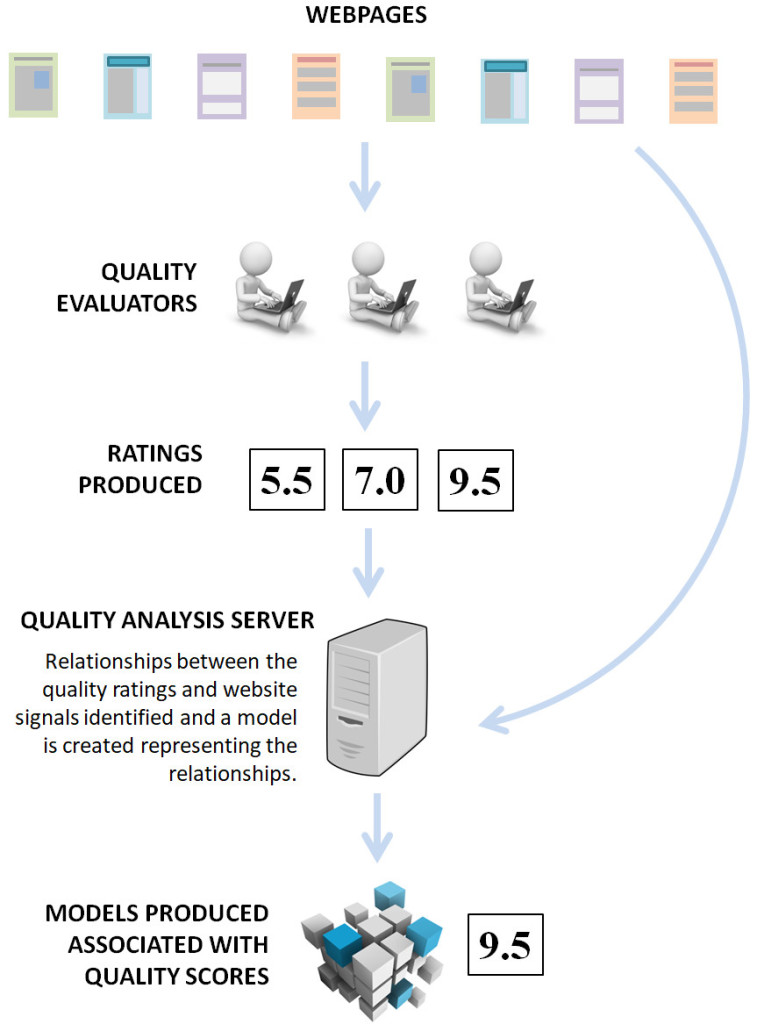Reflections on Reputation – the New(ish) Quality Signal & Ranking Factor
In: Google|Search Engines
23 Jan 2019 I wrote a new SEO article which went live yesterday at Search Engine Land, called “How Reputation Became A Major Ranking Factor in SEO“. While I fully expect that there may be some level of criticism of it because it is based upon some degree of conjecture, all the same the assumptions made are logical ones, based upon many years of experience and sequential building blocks. While I may have got some aspects wrong — Google is a black box, after all — there’s essentially no question that Google’s development of a Quality Score for webpages has occurred, and that the Quality Score is a holistic measure.
I wrote a new SEO article which went live yesterday at Search Engine Land, called “How Reputation Became A Major Ranking Factor in SEO“. While I fully expect that there may be some level of criticism of it because it is based upon some degree of conjecture, all the same the assumptions made are logical ones, based upon many years of experience and sequential building blocks. While I may have got some aspects wrong — Google is a black box, after all — there’s essentially no question that Google’s development of a Quality Score for webpages has occurred, and that the Quality Score is a holistic measure.
Human concepts like Reputation are composed of relatively nebulous elements that Google identifies as Expertise, Authority, and Trustworthiness (“E-A-T”). While humans assess these things subconciously for the most part, in order for Google or other search engines to assess them, measure them and compare the relative reputations of various webpages and websites, they absolutely must do so based upon quantifiable elements — those elements which they are able to measure. The quantifiable elements are often things which may not have a direct or obvious relation to Quality. A website may have a mixture of “good” links and “bad” links — but, links of themselves, even bad ones, probably do not directly relate to Quality. But, what Google’s system has done is compare links in addition to multiple other factors, and in combination, the system has identified relative levels of Quality. They have ultimately associated those levels of Quality with a numeric value — a Quality Score.
My article proposed that they based this in part off of a patent that describes comparing human raters’ values of Quality with combinations of quantifiable factors in order to identify patterns of combinations of the factors — they call these Models. The Models are then compared against all webpages and those that fit within the parameters of the Model templates are then assigned Quality Scores associated with their Model types.

Google’s Quality Score Affects Organic Rankings – human evaluators’ ratings could be fed into a standard machine learning sequence to create abstracted quality score models for different types of webpages.
These Models are now so complex that it would be quite difficult for the engineers that created the systems that produced them to suss out which specific factors were most-influential upon the Quality Scores. Did your site tank because people said bad things about the website elsewhere? Or because you have some mix of poor links? Or because you have too many ads per page or too many ads obscuring/pushing-down/delaying the main content? Or because your Titles resulted in low relative click-through rates from search results? Or because there wasn’t enough main content? Or because users cannot figure out who is behind the website/company? Or because you do not have a privacy policy in place? Or because the pages deliver just slightly too slowly? It can be any and all of these things — and it is now highly likely to be a combination of these and even more.
The combo of elements comprising a Model can be very complex. It could involve a narrow range of elements in combination, too — such as, popup ads might affect quality scores for one type of webpages and not influence another. Or, some degree of negative sentiment may not matter at all for one type of informational pages, but the same level of negative sentiment could seriously impact the quality score of financial or health related pages.
The frustrating aspect of the impacts of machine learning ranking determinations is that Googlers cannot give a lot of specific guidance on what to do to perform well — other than the old standby: “Work on creating great content.”
In truth, you should do a large variety of good things, beginning with developing and maintaining a website that is optimal for search engines. Simply having broken links and too many soft error pages will affect your rankings one way or another — it may dilute your PageRank, weakening the power of all of your pages, and it could result in a negative quality score.
Read the full article for a more thorough understanding:
About [Ag] Search Blog
[Ag] is the symbol for the element Silver and is 47th in the periodic table of elements, an abbreviation for the Latin word for Silver, "Argentum". The [Ag] Search Blog is provided by Argent Media™.
Sharing research, thoughts, commentary about Internet Marketing, SEO, Social Media, Online Reputation Management, and our SEO Expert Witness services.
Photostream
Categories
- Branding & Trademarks (1)
- Industry News & Happenings (31)
- Legal Expert Witness (5)
- Local Search (16)
- Local SEO 101 (5)
- Online Reputation Management – ORM (26)
- Rich Snippets (3)
- Author Markup (2)
- Recipe Rich Snippets (1)
- Search Engine Optimization – SEO (13)
- Search Engines (10)
- SEM (1)
- Google Ads (1)
- Pay-Per-Click (1)
- Shopping Search (1)
- Social Media (14)
- Facebook (3)
- Google Plus (1)
- Twitter (2)
Archives
- June 2024
- January 2023
- September 2021
- December 2020
- May 2020
- December 2019
- October 2019
- March 2019
- January 2019
- November 2018
- October 2018
- September 2018
- July 2018
- June 2018
- January 2018
- November 2017
- October 2017
- July 2017
- January 2017
- December 2016
- March 2016
- September 2015
- August 2015
- June 2015
- May 2015
- April 2015
- March 2015
- February 2015
- June 2014
- April 2014
- October 2013
- September 2013
- August 2013
- March 2013
- February 2013
- January 2013
- December 2012
- November 2012
- July 2012
- June 2012
- May 2012
- March 2012
- February 2012
- January 2012
- Chris Silver Smith: I was approached by the Department of Justice some years ago to provide testimony regarding the pote [...]
- Sean Fagin: Interesting - I had not thought of this niche in SEO! I might have to try out doing this myself. Ho [...]
- How to Make Friends with Influencer Marketing - [Ag] Search Blog: […] My grant from the Chris Smith Institute for Exotic Travel was enough to cover both days of [...]
- Chris Silver Smith: Good point about Gawker being a muckraking site in of itself. But there are a number of others who [...]
- Rob M: Referencing Gawker for character assassination isn't so helpful since they were sued into oblivion b [...]
- AI: The Next Big Thing That “Kills” SEO
- What is an SEO expert called?
- Bob Ross Documentary Creates Huge Reputation Damage for Bob Ross, Inc.
- Online Reputation Management Services
- How does one become an SEO Expert Witness?
- What is an SEO Expert Witness?
- Local SEO Workshop Coming to SMX West 🧭
- Keynote at International Search Summit: International Reputation
- Hear About Twitter Optimization at Content Marketing Conference
- Reflections on Reputation – the New(ish) Quality Signal & Ranking Factor
![[Ag] Search Blog -](https://agsearchblog.com/wp-content/themes/compositio/logo.png)
Comments are closed.